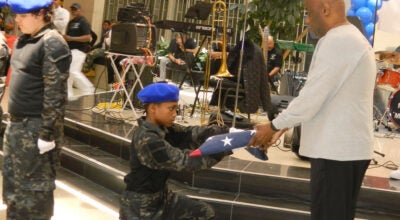New laws take effect in North Carolina
Published 12:00 am Thursday, January 3, 2013
SALISBURY — With the start of the new year Tuesday, sixteen new laws took effect in North Carolina.
They address a wide range of issues, such as day care safety, undocumented workers and the theft of kitchen grease.
One of the new statutes tightens criminal background check requirements for child care workers. These requirements now include home day care operators, as well as volunteers and temporary workers who can be left with children unsupervised.
“If they are never left alone with children, they are not counted in the child-staff ratio, and they’re not required to have a criminal background check,” said Norma Honeycutt, executive director with Partners in Learning Child Development and Family Resource Center. “We have parents who come in and volunteer all the time, and it would discourage that if a background check was required.”
New hires must now have a cleared background check in hand before starting child care work, and current employees must re-apply for full certification every three years.
This process includes county, state and federal background checks. Previously, federal checks were only required if the person lived outside North Carolina for at least five years.
The law also bans people from working in child care if they have been convicted of child neglect or abuse, a sex offense or an attempted sex offense.
Honeycutt said the biggest potential headache with the new law could be getting background checks back in a timely manner.
“When you need a new teacher, you need a new teacher,” Honeycutt said. “When there’s a long wait, it could be a real problem.”
But the state has said its paperwork will come back within a week, and the federal turnaround should be the same.
“If that happens, I think it’s a wonderful thing,” she said. “It was absolutely needed.”
Robin Kluttz-Ellison, owner and director of Noah’s Playloft Preschool in Salisbury, said she has more mixed feelings about the law.
She said the preschool already waits for local background checks to come back before hiring employees, and it doesn’t leave any volunteers alone with children. But like Honeycutt, she’s worried that the state and federal checks might slow down the hiring process.
In addition, Kluttz-Ellison said background checks are done at the employees’ expense, so the stricter recertification process means that long-time workers will pay more.
“We don’t want to discourage people from coming into the field, because it’s costly to be employed in child care as it is,” she said.
But the new requirements also benefit child care, she said, especially at franchises or small facilities where there isn’t as much oversight.
“What they’re researching, it’s good for us,” Kluttz-Ellison said. “We have heard of some (workers) being flagged or kicked out once Raleigh comes through.”
Fred Steen, a Rowan County resident and former state representative in the 76th district, was a primary sponsor of the law. Steen did not return calls for comment Wednesday.
• • •
Also on Jan. 1, the state continues to roll out a law requiring employers to check the work eligibility of new hires through the national e-Verify system.
In October 2012, the law went into effect for counties, municipalities and businesses with at least 500 employees.
As of Tuesday, businesses employing between 100 and 499 people are also required to use the e-Verify system. The final phase on July 1 will bring in employers that have between 25 and 99 employees.
N.C. Rep. Harry Warren, a Rowan County resident who represents the 77th District, was a primary sponsor of the law. He said Wednesday that the phased approach is meant to give businesses time to implement the program and slow the flood of calls to the state office.
“It just seemed like there was a need to help determine the eligibility of employees in the state,” Warren said. “I looked at it as being a jobs bill, to help get North Carolinians who are legally eligible to work in the state to get a job here legally.”
He said the national database is a more reliable way to flag things like false social security numbers, false drivers’ licenses and other fraudulent information.
“This is designed to catch them,” Warren said. “It works through Homeland Security and other federal agencies.”
E-Verify is an Internet-based system. For some employers, Warren said, following the law could be as simple as making a phone call to a human resources representative. That person would then enter the new hire’s information into the system as part of a routine verification process.
Opponents of the law have raised concerns that the system is inaccurate and could unfairly block authorized workers from getting a job.
But Warren said the system has a 97 percent accuracy rate, and the state will allow an eight-day window to correct any misinformation returned on an applicant.
• • •
Another new law targets people who steal leftover kitchen grease, which can be sold and recycled.
Under the law, sponsored by N.C. Rep. John Torbett of Gaston County, stealing used cooking oil is defined as a misdemeanor. The theft becomes a felony if the value of the stolen grease and its container is more than $1,000.
If grease is deposited into a container with a name on it, the person named is its the presumed owner. But in case any thieves try this, labeling someone else’s grease container to claim ownership of it is against the law now, too.
A full list of state statutes going into effect over the next year can be found at www.ncleg.net.
Contact reporter Karissa Minn at 704-797-4222.
Twitter: twitter.com/postcopolitics
Facebook: facebook.com/Karissa.SalisburyPost




